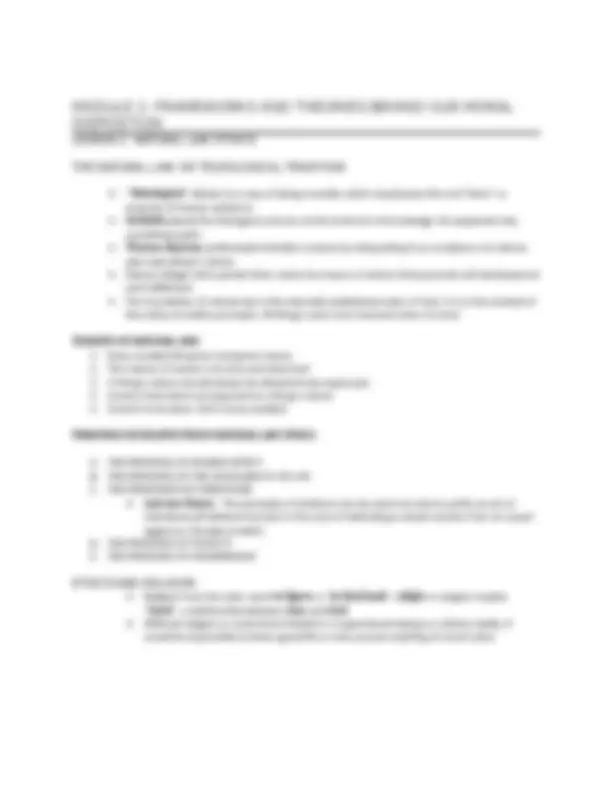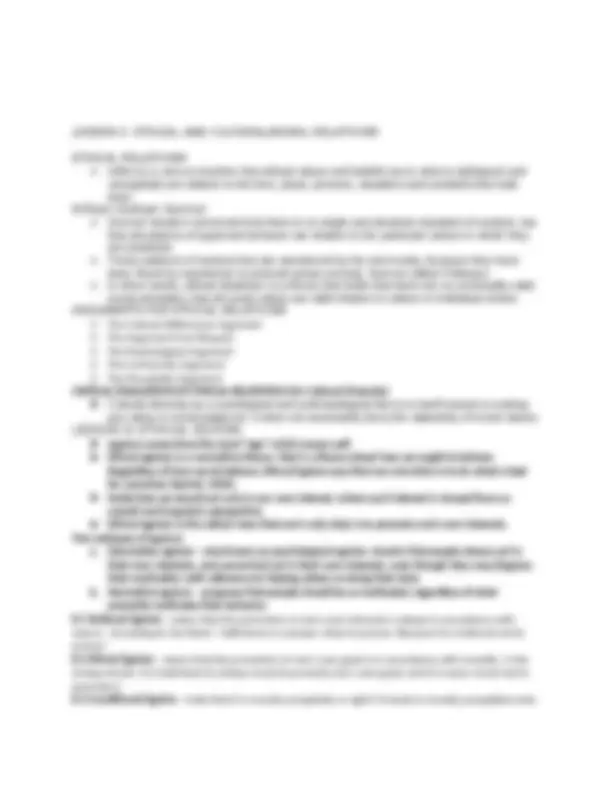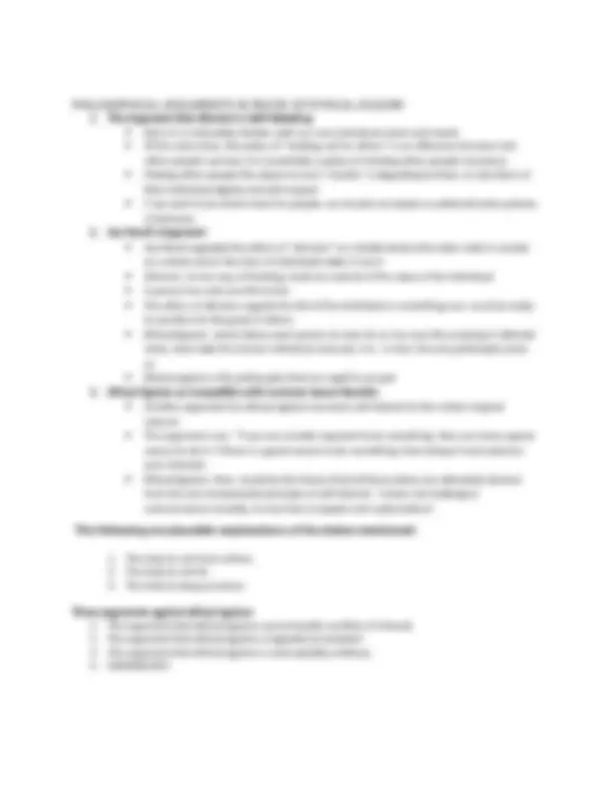





Study with the several resources on Docsity

Earn points by helping other students or get them with a premium plan


Prepare for your exams
Study with the several resources on Docsity

Earn points to download
Earn points by helping other students or get them with a premium plan
Community
Ask the community for help and clear up your study doubts
Discover the best universities in your country according to Docsity users
Free resources
Download our free guides on studying techniques, anxiety management strategies, and thesis advice from Docsity tutors
reviewer for mid term in ethics
Typology: Schemes and Mind Maps
1 / 7

This page cannot be seen from the preview
Don't miss anything!




What is morality? James W. Gray, 2011, stated that morality involves what we ought to do, right and wrong, good and bad, values, justice, and virtues. Morality is taken to be important ; moral actions are often taken to merit praise and rewards, and immoral actions are often taken to merit blame and punishment. Morality is the quality of right and wrong in the human acts. When we say Human acts, it pertains to acts done with knowledge and consent. What we ought to do - What we morally ought to do is what’s morally preferable. It’s morally preferable to give to certain charities and to refrain from hurting people who make us angry; so, we morally ought to do these things. Right and wrong - Something is morally right if it’s morally permissible, and morally wrong if it’s morally impermissible. Good and bad - “Good” and “bad” refer to a positive and negative value. Something is morally good if it helps people attain something of positive value, avoid something of negative value, or has a positive value that merits being a goal. ETHICAL SCIENCE Ethical Science is particularly concerned with the study of man and the human conduct, and is, therefore, especially related to all those sciences dealing with the study of human nature and human living.
Moral issue – it may be helpful to distinguish a situation that calls for moral valuation. Moral decision – when one is placed in a situation and confronted by the choice of what action to perform. Moral judgment - when a person is an observer who assesses the actions or behavior of someone. Principles – rationally established grounds by which one justifies and maintains her moral decision and judgments. Moral dilemma is a situation where…
refers to a view or doctrine that ethical values and beliefs (as to what is right/good and wrong/bad) are relative to the time, place, persons, situations and societies that hold them. William Graham Sumner Sumner became convinced that there is no single and absolute standard of conduct, but that all patterns of approved behavior are relative to the particular culture in which they are practiced. Those patterns of conduct that are sanctioned by the community, because they have been found by experience to promote group survival, Sumner called Folkways. In other words, ethical relativism is a theory that holds that there are no universally valid moral principles; that all moral values are valid relative to culture or individual choice. ARGUMENTS FOR ETHICAL RELATIVISM The Cultural Differences Argument The Argument from Respect The Psychological Argument The Conformity Argument The Provability Argument CRITICAL EVALUATION OF ETHICAL RELATIVISM (On Cultural Diversity) Cultural diversity as a sociological and anthropological fact is in itself neutral to making any value or moral judgment. It does not necessarily deny the objectivity of moral values.
egoism comes from the word “ego” which means self. Ethical egoism is a normative theory- that is a theory about how we ought to behave. Regardless of how we do behave, Ethical Egoism says that our only duty is to do what is best for ourselves (Rachel, 2004). Holds that we should act only in our own interest, where such interest is viewed from an overall and long-term perspective. Ethical egoism is the radical view that one’s only duty is to promote one’s own interests. Two subtypes of egoism: a. Descriptive egoism – also known as psychological egoism. Asserts that people always act in their own interests, and cannot but act in their own interests, even though they may disguise their motivation with reference to helping others or doing their duty. b. Normative egoism – proposes that people should be so motivated, regardless of what presently motivates their behavior. B.1 Rational Egoism - claims that the promotion of one’s own interests is always in accordance with reason. According to Ayn Rand, “selfishness is a proper virtue to pursue. Because it is irrational not to pursue”. B.2 Ethical Egoism - claims that the promotion of one’s own good is in accordance with morality. In the strong version, it is held that it is always moral to promote one’s own good, and it is never moral not to promote it. B.3 Conditional Egoism - holds that it is morally acceptable or right if it leads to morally acceptable ends.
1. The Argument that Altruism is Self-Defeating Each of us intimately familiar with our own individual wants and needs. At the same time, the policy of “looking out for others” is an offensive intrusion into other people’s privacy; it is essentially a policy of minding other people’s business. Making other people the object of one’s “charity” is degrading to them; it robs them of their individual dignity and self-respect. If we want to do what is best for people, we should not adopt so-called altruistic policies of behavior. 2. Ayn Rand’s Argument Ayn Rand regarded the ethics of “altruism” as a totally destructive idea, both in society as a whole and in the lives of individuals taken in by it. Altruism, to her way of thinking, leads to a denial of the value of the individual. A person has only one life to live. The ethics of altruism regards the life of the individual as something one must be ready to sacrifice for the good of others. Ethical Egoism, which allows each person to view his or her own life as being of ultimate value, does take the human individual seriously- it is , in fact, the only philosophy does so. Ethical egoism is the philosophy that we ought to accept. 3. Ethical Egoism as Compatible with Common Sense Morality Another argument for ethical egoism connects self-interest to the notion of good reasons. The argument runs: “If you are morally required to do something, then you have a good reason to do it. If there is a good reason to do something, then doing it must advance your interests. Ethical Egoism, then, would be the theory that all these duties are ultimately derived from the one fundamental principle of self-interest. It does not challenge a commonsense morality; it only tries to explain and systematize it. The following are plausible explanations of the duties mentioned: